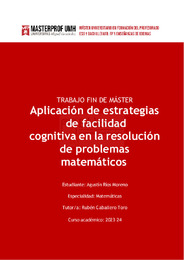Por favor, use este identificador para citar o enlazar este ítem:
https://hdl.handle.net/11000/33014Registro completo de metadatos
| Campo DC | Valor | Lengua/Idioma |
|---|---|---|
| dc.contributor.advisor | Caballero Toro, Rubén | - |
| dc.contributor.author | Ríos Moreno, Agustín | - |
| dc.contributor.other | Departamentos de la UMH::Estadística, Matemáticas e Informática | es_ES |
| dc.date.accessioned | 2024-09-09T08:31:46Z | - |
| dc.date.available | 2024-09-09T08:31:46Z | - |
| dc.date.created | 2024 | - |
| dc.identifier.uri | https://hdl.handle.net/11000/33014 | - |
| dc.description | Especialidad: Matemáticas | es_ES |
| dc.description.abstract | El principal objetivo de la enseñanza de las matemáticas es dotar al alumnado de herramientas y técnicas matemáticas para que sea capaz de afrontar y resolver problemas. Por ello, se concentran muchos esfuerzos en encontrar las mejores técnicas y estrategias para enseñar y guiar a los alumnos hacia la adquisición de esta habilidad. A partir de la revisión de las metodologías surgidas se propone ampliar en este sentido el espectro, es decir, apoyarse en otros aspectos influyentes en la comprensión de los problemas matemáticos que no tienen relación con la parte numérica. En concreto, este trabajo se centrará en la forma en que se presentan los enunciados y cómo la forma influye en la lectura, comprensión y entendimiento del problema, aspectos básicos y previos a la realización de cualquier cálculo. Para ello, se pondrán de manifiesto las ideas del psicólogo y premio Nobel Daniel Kahneman sobre el funcionamiento de nuestro pensamiento; en concreto, se analiza cómo la primera impresión y el instinto pueden superponerse al pensamiento más lógico y racional. Teniendo en cuenta esta línea teórica y otros estudios sobre la influencia en nuestra comprensión de un texto a partir de cómo se presenta, en este trabajo se propone una propuesta práctica en la cual se desarrollan varios problemas matemáticos, denominados de letra (enunciado relevante) y se desarrollan a la realidad del aula para comprobar su eficacia. Los resultados obtenidos han resultado satisfactorios, indicando la viabilidad de implantación en el aula y reforzando las teorías de Kahneman. | es_ES |
| dc.description.abstract | The main objective of mathematics education is to provide students with mathematical tools and techniques to be able to cope with and solve problems. Therefore, many efforts are concentrated on finding the best techniques and strategies to teach and guide students towards the acquisition of this skill. From the review of the methodologies that have emerged, it is proposed to broaden the spectrum in this sense, i.e., to rely on other influential aspects in the understanding of mathematical problems that are not related to the numerical part. Specifically, this work will focus on the way in which the statements are presented and how the form influences the reading, understanding and comprehension of the problem, basic and previous aspects to the realization of any calculation. To this end, the ideas of the psychologist and Nobel Prize winner Daniel Kahneman on the functioning of our thinking will be highlighted; in particular, it will be analyzed how first impressions and instinct can be superimposed on more logical and rational thinking. Taking into account this theoretical line and other studies on the influence on our unders- tanding of a text based on how it is presented, this paper proposes a practical proposal in which several mathematical problems are developed, called letter problems (relevant statement) and are developed to the reality of the classroom to test their effectiveness. The results obtained have been satisfactory, indicating the feasibility of implementa- tion in the classroom and reinforcing Kahneman’s theories. | es_ES |
| dc.format | application/pdf | es_ES |
| dc.format.extent | 24 | es_ES |
| dc.language.iso | spa | es_ES |
| dc.publisher | Universidad Miguel Hernández de Elche | es_ES |
| dc.rights | info:eu-repo/semantics/openAccess | es_ES |
| dc.rights | Attribution-NonCommercial-NoDerivatives 4.0 Internacional | * |
| dc.rights.uri | http://creativecommons.org/licenses/by-nc-nd/4.0/ | * |
| dc.subject | Aprendizaje | es_ES |
| dc.title | Aplicación de estrategias de facilidad cognitiva en la resolución de problemas matemáticos | es_ES |
| dc.type | info:eu-repo/semantics/masterThesis | es_ES |

Ver/Abrir:
TFM RIOS MORENO, AGUSTIN.pdf
1,45 MB
Adobe PDF
Compartir:
 La licencia se describe como: Atribución-NonComercial-NoDerivada 4.0 Internacional.
La licencia se describe como: Atribución-NonComercial-NoDerivada 4.0 Internacional.
.png)